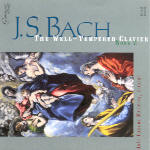João Carlos Martins’ 1964 traversal of Bach’s Well-Tempered Clavier Book Two proves as equally confrontational and iconoclastic as the 24-year-old pianist’s Book One. Yet, by and large, the results are more convincing. Martins gets off on the right foot with a brash and breezy C Major Prelude and Fugue, and keeps up the perky momentum in the C Minor Prelude. His snail-paced C Minor Fugue, however, gets slower with each little hold-back and rubato conceit. Likewise, the great, ricercare-like E Major Fugue is static and freeze-dried. But Martins makes more of the G major prelude’s shifting inner rhythms than pianists who rattle it off like a toccata. Martins saves his most unusual and remarkable interpretation for the complex F-sharp minor fugue. He begins with whispering staccatos that gradually morph into stinging keyboard jabs, while each episode bears its own tempo. You may not agree with all of Martins’ ideas, nor endorse his stinginess vis-à-vis repeats, but he always forces you to rethink the music. The bright, close-up engineering reflects Martins’ gaunt, flinty sonority. It sounds as though certain selections are remastered from LPs, rather than tape sources. All told, a provocative listening experience.
































